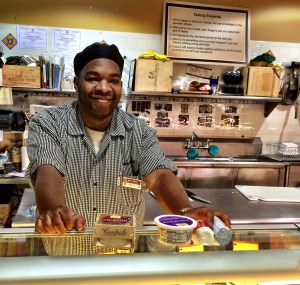 Branding as you or branding as an entity plays a large role in how a customer wants to interact with you.
Branding as you or branding as an entity plays a large role in how a customer wants to interact with you.
Let’s say you’re strolling through a lovely neighborhood of small shops. You walk into one shop, and after browsing around, you have some questions, but there’s no one that seems to work there. Then you notice a kiosk where you can place an order or submit a question. The store seems attractive, well stocked and professional – but you’re turned off that “no one’s home”. The lack of staff seems almost disrespectful, uncaring, unwelcoming.
 You walk into the next shop, and the owner greets you, let’s you wander freely, and offers to answer any questions you may have. Where would you prefer to shop?
You walk into the next shop, and the owner greets you, let’s you wander freely, and offers to answer any questions you may have. Where would you prefer to shop?
Clearly the one with the human.
If you’re a business owner, you may be tempted to try to impress your audience and customers with creating a sense of “a fancy” or “a bigger” company. You don’t want them to think it’s just you or you and your partner running things. You feel that if your customer is aware of the small team of resources, that they’ll opt for a bigger company instead.
20 years ago, that may have been true. But not today.
The advantages of marketing in today’s world revolves around PERSONAL and EMOTIONAL. If you can inject real life stories, if you can make the customer feel taken care of, that they can develop a real relationship with real people, then you can more easily grow your customer base. Think about which store you’ll return to the next time you’re in the area: store #1 or store #2.
Even if you’re a service provider, this holds true – so what should you look out for and change?
Email address – if you’re using the info@companyname.com email address you set up in 1995, please change it. “info@” FEELS as though there’s a robot behind the counter – there’s no one to talk to and no one is actually there minding the store.
What to use?
If the business is run by you and your partner – John-and-Mary@Funcompany.com. If you’re on your own – susana@RightclickAdvantage.com (😊)
Along these lines, if you’re on your own, or clearly the principle of the company, and you’re the one providing the service and answering the phone, should you use “We” or “I” in your website and brochure content? People feel that using “we” implies that you’re bigger than you actually are. But is being big the real advantage? Not even close.
Think about whether you want to build the brand independently (someday there will be employees to interact with) or whether it feels right for the brand to be YOU– the customer will only ever need to speak with you, even if you have a team working in the background. So if I grow my business to include an office manager and a campaign designer, I would create an email address with their name or at the least their title. For example, OfficeMgr@… However, Iwould prefer to say, “Email our office manager, Sherry, at Sherry@rightclickadvantage.com.
Is all this really important?
If you want to your audience to stop in once and shop once, then it’s not critical. But if you want to develop a loyal following and long term buying relationship, then Small-and-Warm will win over Big-and-Cold every time. Give people a sense of making a real connection. Bring them into a relationship.
While I can’t predict which marketing trends will be popular in the year 2050, I do know that this advice holds true in 2017 and in the near future.
Marketing Strategy is the difference between inconsistent, occasional sales -and- steady, repeat business. if you suspect your strategic plan needs a makeover (or perhaps never existed), I welcome you to take the first step by scheduling a free Discovery Call with ME. Not President, not CEO – Me. It’s entirely possible that just a few tweaks can make a huge difference. Email ME – Susana@Rightclickadvantage.com.

